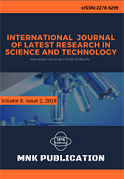DOI:10.29111/ijlrst ISRA Impact Factor:3.35, Peer-reviewed, Open-access Journal
Research Paper Open Access
International Journal of Latest Research in Science and Technology Vol.5 Issue 3, pp 1-5,Year 2016
Correspondence should be addressed to :
Received : 24 May 2016; Accepted : 10 June 2016 ; Published : 30 June 2016

| Download | 125 |
|---|---|
| View | 179 |
| Article No. | 10655 |
The aim of the present study is to look into the effectiveness of applying certain interactive methods in teaching 8th grade students in the subject Biology and Health Education. The object of study is the process of teaching in Biology and Health Education lessons in Hristo Botev comprehensive school in the town of Kubrat. The subject of study are the interactive methods (case study, incident, associations, mind mapping, brainstorming and simulation) used in the lessons in Biology and Health Education for the ecological and health education of 8th grade students. The study was conducted in Hristo Botev comprehensive school in the town of Kubrat, Razgrad region in 2011/2012 academic year. The topics included: Hygiene and Respiratory System, Hygiene and Nervous System, The Role of Man in Nature. The article presents illustrated fragments of methodological models of lessons with the use of interactive teaching methods. The results of the study are presented both qualitatively and quantitatively. A survey was conducted among the students aimed at collecting their opinions on the interactive methods used in teaching the abovementioned topics. The conclusions are based on the obtained empirical results. The study is a practical contribution to biology didactics in terms of using interactive methods for improving students' ecological and health education.
Copyright © 2016 Maria Boycheva et al. This is an open access article distributed under the Creative Commons Attribution 4.0 International (CC BY 4.0) license which permits unrestricted use, distribution, and reproduction in any medium, provided the original work is properly cited.
Â
Â
Maria Boycheva, Maya Radeva, Rositsa Davidova , " The Use Of Interactive Methods In Ecological And Health Education Of 8th Grade Students In The Subject Of Biology And Health Education ", International Journal of Latest Research in Science and Technology . Vol. 5, Issue 3, pp 1-5 , 2016

MNK Publication was founded in 2012 to upholder revolutionary ideas that would advance the research and practice of business and management. Today, we comply with to advance fresh thinking in latest scientific fields where we think we can make a real difference and growth now also including medical and social care, education,management and engineering.

We offers several opportunities for partnership and tie-up with individual, corporate and organizational level. We are working on the open access platform. Editors, authors, readers, librarians and conference organizer can work together. We are giving open opportunities to all. Our team is always willing to work and collaborate to promote open access publication.

Our Journals provide one of the strongest International open access platform for research communities. Our conference proceeding services provide conference organizers a privileged platform for publishing extended conference papers as journal publications. It is deliberated to disseminate scientific research and to establish long term International collaborations and partnerships with academic communities and conference organizers.